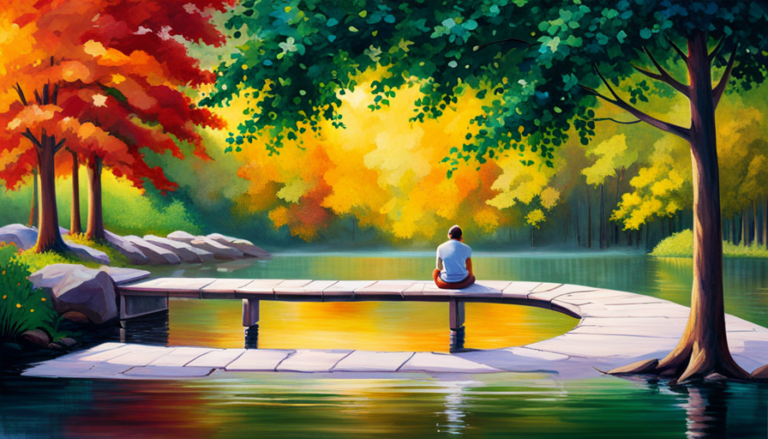Top 5 Relaxation Techniques To Combat Stress And Anxiety
Everyone experiences stress and anxiety from time to time. It’s normal to feel overwhelmed when faced with a difficult…
Everyone experiences stress and anxiety from time to time. It’s normal to feel overwhelmed when faced with a difficult situation. But when stress and anxiety become too much to handle, it’s important to take action and find ways to relax.
Fortunately, there are several relaxation techniques you can use to help reduce stress and anxiety. In this article, we’ll explore the top 5 relaxation techniques to combat stress and anxiety.
From deep breathing exercises to guided imagery, yoga, and meditation, you’ll find plenty of effective methods to help you relax and de-stress.
So, let’s get started on your journey to a calmer, more peaceful mind and body.
Key Takeaways
- There are several relaxation techniques to combat stress and anxiety, including deep breathing exercises, guided imagery, yoga, meditation, and progressive muscle relaxation.
- Relaxation techniques should be practiced regularly to help reduce stress and anxiety, improve mental and physical health, and promote overall wellbeing and a sense of peace.
- Relaxation techniques can be adapted to fit individual needs and preferences, and can be used in combination with other stress-reducing activities.
- Mindful eating and journaling practices can also be incorporated into relaxation techniques.
Deep Breathing Exercises
Taking a few minutes to practice deep breathing exercises can help you reduce stress and anxiety instantly – give it a try!
Deep breathing techniques are a simple, yet powerful way to help relax your body and mind. When you take slow, deep breaths from your diaphragm, it releases the physical tension in your body, allowing your muscles to relax and promoting a calmer state of mind.
This type of breathing also helps to reduce your heart rate and lower your blood pressure, providing you with a sense of control and balance.
Incorporating simple muscle relaxation into your deep breathing can help increase the effectiveness of the exercise. As you breathe, focus on tensing and releasing different muscle groups throughout your body, such as your shoulders, arms, legs, and feet. This helps to reduce the physical tension throughout your body, allowing you to relax and feel more at ease.
By practicing deep breathing exercises regularly, you can help reduce stress and anxiety and promote a calmer, more balanced state of mind. As you become more comfortable with the process, you can move on to the next step of relaxation – guided imagery.
Guided Imagery
You’ll love trying out guided imagery as a way to help reduce your worries. Guided imagery is a type of music therapy that uses its own style of sound-based music to create images and feelings in the mind. It is a form of journaling therapy that encourages participants to be present in the moment and to focus on their innermost thoughts and feelings. This form of relaxation can be used to help reduce stress and anxiety.
The music used in guided imagery is designed to invoke powerful images and emotions in the listener. It is often accompanied by a narrative to help guide the listener’s mind. Guided imagery works by helping to create a sense of calm, allowing the listener to become more aware of their own thoughts and feelings. This can help to reduce stress and provide relief from anxiety. Ultimately, guided imagery can be a great way to relax and reduce stress. By taking the time to practice this form of relaxation, you can help to reduce your stress levels and find peace. Without further ado, you can move onto the next relaxation technique – yoga.
Yoga
Yoga is an amazing way to relax and reduce your worries. It’s a holistic practice that combines body movement, breathing, and relaxation techniques to help manage stress and anxiety.
Here are just a few of the benefits that yoga can bring to your life:
- Improved mental clarity and focus
- Reduced stress and anxiety levels
- Increased flexibility and overall physical health
Yoga can be a great way to practice progressive muscle relaxation and journaling therapy. It can help create a sense of calmness and peace. It can also provide a much-needed break in our busy lives.
As you practice the poses, breathing exercises, and relaxation techniques, you can find yourself feeling more relaxed and less stressed. Transitioning into meditation can be the perfect next step to further reduce stress and anxiety.
Meditation
Dive into meditation and breathe away your worries, feeling the weight of the world lift from your shoulders like a feather in the wind. Meditation is an ancient practice that has been used for centuries to bring about peace and tranquility. It has been proven to reduce stress and anxiety levels, improve focus and concentration, and increase feelings of wellbeing. Mindful eating and journaling practices are often incorporated into meditation practice as a way to further deepen the experience.
The practice of meditation is simple but powerful. It involves setting aside time to sit still and focus your attention on your breath and body. You can use a mantra or visualization to help guide your attention, or you can simply observe your thoughts and feelings without judgment. The goal is to be aware of what is happening in the present moment without getting caught up in it.
| Benefits | How to Practice | Tips | ||
|---|---|---|---|---|
| Reduced stress & anxiety | Find a comfortable place to sit | Start small and be gentle with yourself | ||
| Improved focus & concentration | Focus your attention on your breath | Accept distractions & move on | ||
| Increased wellbeing | Incorporate mindful eating & journaling | Experiment to find what works for you | Practice self-compassion and gratitude. |
Conclusion
Relaxation techniques can be powerful tools for calming your mind and body. They can help you reduce stress and anxiety and find a sense of inner peace. Think of them as a breath of fresh air, a much-needed rest, or a comforting embrace.
With a little practice, relaxation techniques can be your safe harbor in even the stormiest of seas. So take some time out of your day to relax, breathe deeply, and find your inner balance. You’ll be glad you did.


